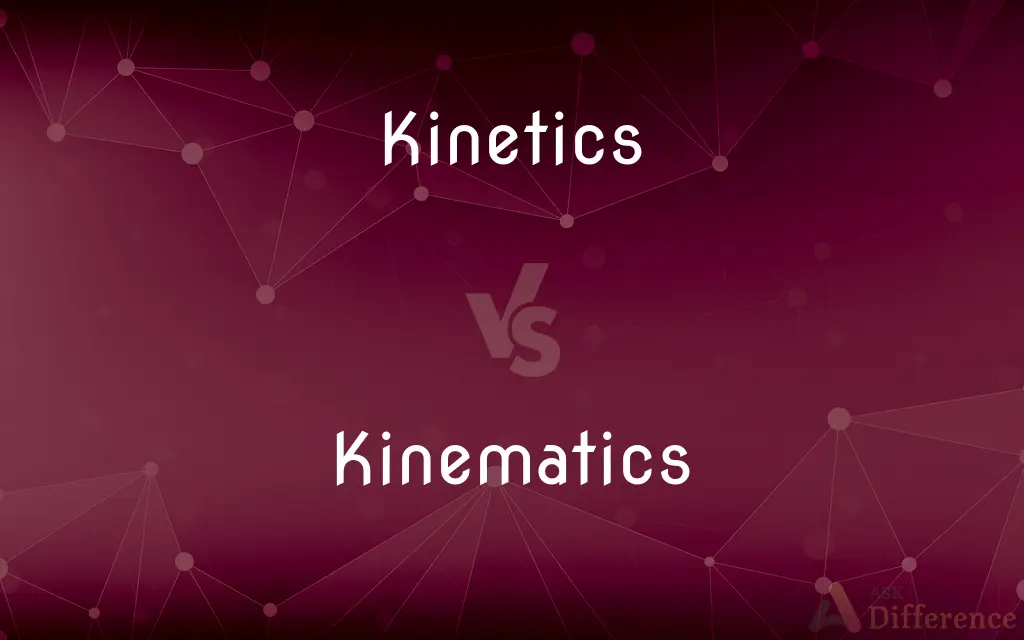Kinetics vs. Kinematics — What's the Difference?
By Tayyaba Rehman — Updated on September 20, 2023
Kinetics deals with the forces causing motion and the interactions involved, while kinematics focuses solely on the geometry of motion without considering forces. Both are subfields of physics but differ in scope and application.

Difference Between Kinetics and Kinematics
Table of Contents
ADVERTISEMENT
Key Differences
Kinetics is the branch of physics that investigates the relationships between the forces acting on a system and its motion. Kinematics, on the other hand, deals with the description of motion itself, without any regard to the forces or the cause of the motion. Kinetics involves terms like acceleration, friction, and torque, whereas kinematics concerns itself with velocity, displacement, and time.
Kinetics studies how forces like gravity, tension, and friction affect motion. It is often associated with dynamic systems where forces are constantly changing. Kinematics, conversely, provides a more generalized view of motion and is usually associated with simpler systems where forces are not explicitly considered. It's about the "what" of motion, not the "why."
In kinetics, equations of motion often include force variables, and solving these equations requires understanding the origin of these forces. In kinematics, equations describe geometric properties of motion, such as speed and direction, without needing to consider forces at all. It’s often the first thing studied in physics to understand motion without the complications of forces.
In summary, kinetics delves into the cause-effect relationships in motion and includes considerations of external forces. Kinematics is the study of motion in the abstract, solely concerned with parameters like speed, direction, and time. They are both vital aspects of physics but serve different investigative purposes.
Comparison Chart
Definition
Studies forces and motion
Studies motion only
ADVERTISEMENT
Focus
Cause of motion
Description of motion
Equations
Includes force variables
No force variables
Complexity
Dynamic systems
Simpler systems
Typical Parameters
Force, torque, friction
Velocity, displacement
Compare with Definitions
Kinetics
Physics branch concerned with motion and forces.
The kinetics of the system involved complex calculations.
Kinematics
Physics branch dedicated to describing motion.
Kinematics uses equations to describe motion succinctly.
Kinetics
Study of forces causing motion.
Kinetics helps us understand why objects move as they do.
Kinematics
Study of motion without considering forces.
Kinematics can describe the path of a thrown ball.
Kinetics
Concerned with the cause and effect of motion.
Kinetics can explain why friction slows down motion.
Kinematics
Involves parameters like velocity, displacement, and time.
Kinematics can help calculate how long it takes for a car to stop.
Kinetics
Investigation of dynamic systems and interactions.
The kinetics of chemical reactions can be quite complex.
Kinematics
Focuses solely on the geometry of motion.
The kinematics of the system were easier to solve.
Kinetics
See dynamics.
Kinematics
Concerned with the "what" not the "why" of motion.
Kinematics tells us what happens, not why it happens.
Kinetics
The branch of chemistry that is concerned with the rates of change in the concentration of reactants in a chemical reaction.
Kinematics
Kinematics is a subfield of physics, developed in classical mechanics, that describes the motion of points, bodies (objects), and systems of bodies (groups of objects) without considering the forces that cause them to move. Kinematics, as a field of study, is often referred to as the "geometry of motion" and is occasionally seen as a branch of mathematics.
Kinetics
(mechanics) The branch of mechanics concerned with motion of objects, as well as the reason i.e. the forces acting on such bodies. This, along with kinematics constitute dynamics, which is concerned purely with the effects of forces on moving bodies.
Kinematics
The branch of mechanics that studies the motion of a body or a system of bodies without consideration given to the forces acting on it.
Kinetics
(chemistry) The branch of chemistry that is concerned with the rates of chemical reactions.
Kinematics
(physics) The branch of mechanics concerned with objects in motion, but not with the forces involved.
Kinetics
See Dynamics.
Kinematics
The science which treats of motions considered in themselves, or apart from their causes; the comparison and relation of motions.
Kinetics
The branch of mechanics concerned with the forces that cause motions of bodies
Kinematics
The branch of mechanics concerned with motion without reference to force or mass
Kinetics
Includes variables like force, acceleration, and friction.
The kinetics of the falling apple include the force of gravity.
Common Curiosities
Are Kinetics and Kinematics related?
Both are subfields of physics focused on motion, but they differ in scope and focus.
Does Kinetics involve equations?
Yes, kinetics involves equations that usually include force variables.
What is Kinematics?
Kinematics is the study of motion without considering forces.
Which is more complex, Kinetics or Kinematics?
Kinetics is generally more complex as it deals with dynamic systems and forces.
Is Kinetics concerned with the 'why' of motion?
Yes, kinetics seeks to understand why and how motion occurs.
What is Kinetics?
Kinetics is the study of forces causing motion and their effects.
Does Kinematics involve equations?
Yes, kinematics involves equations that describe motion without force variables.
What do you study first, Kinetics or Kinematics?
Kinematics is often studied first to understand motion without the complexity of forces.
Can Kinetics be applied to chemical reactions?
Yes, kinetics also studies the rate of chemical reactions.
Is Kinematics only applicable to physics?
While primarily a physics term, kinematics concepts are also used in engineering and computer graphics.
Can Kinematics be theoretical?
Yes, kinematics can be purely theoretical, describing idealized motion.
What are the key parameters in Kinematics?
Velocity, displacement, and time are key parameters in kinematics.
Can Kinetics be experimental?
Yes, kinetics often involves experimental methods to understand forces.
What are the key parameters in Kinetics?
Force, acceleration, and friction are key parameters in kinetics.
Is Kinematics concerned with the 'why' of motion?
No, kinematics is concerned with the 'what' of motion, not the 'why.'
Share Your Discovery

Previous Comparison
Protozoa vs. Algae
Next Comparison
Value vs. VirtueAuthor Spotlight
Written by
Tayyaba RehmanTayyaba Rehman is a distinguished writer, currently serving as a primary contributor to askdifference.com. As a researcher in semantics and etymology, Tayyaba's passion for the complexity of languages and their distinctions has found a perfect home on the platform. Tayyaba delves into the intricacies of language, distinguishing between commonly confused words and phrases, thereby providing clarity for readers worldwide.













































